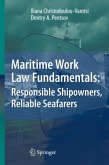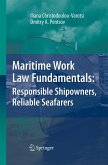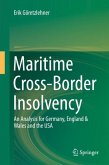With the worldwide upsurge of lawsuits against classification societies, their liability towards third parties has become one of the most contentious issues in contemporary maritime law. Against this background, the authors analyze potential third-party claims and examine to what extent classification societies may limit their liability. Given that the major classification societies are global players, these questions must be addressed from an international and comparative law perspective. Therefore, this study highlights the development in Australian, English, French, New Zealand, and U.S. law before discussing the relevant issues under German law.
Classification societies are charged with the technical supervision of maritime shipping to enhance the safety of life and property at sea by securing high te- nical standards of design, manufacture, construction and maintenance of seagoing vessels. Each and every shipping catastrophe caused by a technical defect reminds the maritime world of the central importance of the vessel's proper technical supervision. Correspondingly, the liability of classification societies has become a particularly discussed issue over the past years. Their contractual liability is usually limited by general terms and conditions incorporated in the classification rules and cases brought by typical contracting partners of classification societies, such as ship owners and ship yards, are not an issue in the current debate. H- ever, one can note a substantial worldwide increase of actions brought by parties who are not in privity with classification societies. This study focuses on third-party liability of classification societies. It ori- nates in an expert opinion on selected issues relating to third-party liability which the authors compiled for the German classification society Germanischer Lloyd AG. Driven by the highly interesting legal issues and unexplored shores in this area of law, we continued our research and are able to present a relatively c- prehensive overview on the law on third-party liability of classification societies. Given the origins of our work, the discussion of limitations of liability clauses is based on the standard terms and conditions of the Germanischer Lloyd, version 2005.
Classification societies are charged with the technical supervision of maritime shipping to enhance the safety of life and property at sea by securing high te- nical standards of design, manufacture, construction and maintenance of seagoing vessels. Each and every shipping catastrophe caused by a technical defect reminds the maritime world of the central importance of the vessel's proper technical supervision. Correspondingly, the liability of classification societies has become a particularly discussed issue over the past years. Their contractual liability is usually limited by general terms and conditions incorporated in the classification rules and cases brought by typical contracting partners of classification societies, such as ship owners and ship yards, are not an issue in the current debate. H- ever, one can note a substantial worldwide increase of actions brought by parties who are not in privity with classification societies. This study focuses on third-party liability of classification societies. It ori- nates in an expert opinion on selected issues relating to third-party liability which the authors compiled for the German classification society Germanischer Lloyd AG. Driven by the highly interesting legal issues and unexplored shores in this area of law, we continued our research and are able to present a relatively c- prehensive overview on the law on third-party liability of classification societies. Given the origins of our work, the discussion of limitations of liability clauses is based on the standard terms and conditions of the Germanischer Lloyd, version 2005.








